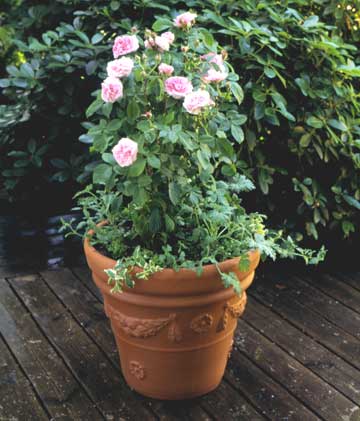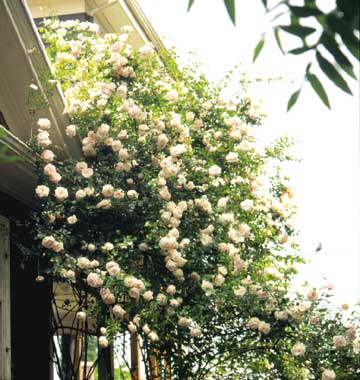





 If you have room for a pot, you have plenty of space for arose garden.
If you have room for a pot, you have plenty of space for arose garden.
Choose the right container. Wooden tubs work well; plastic pots hold moisture, while unglazed terra-cotta dries out quickly. A smaller miniature rose (from 6 to 18 inches tall) needs a pot at least 6 to 8 inches deep; a 2- to 3-foot standard rose requires a container at least 18 inches deep. Make sure the pot has a drainage hole.
Click here to learn how to cut and prune your roses.
continue reading belowImprove the soil. Add one scoop of organic matter, such as composted manure, mushroom compost, or garden compost, for every three scoops of regular potting soil. Some gardeners swear by adding a scoop of peat moss (to retain moisture), as well as a scoop of bonemeal (for extra nitrogen and phosphorus). Add water-holding polymer granules (available from garden centers and mail-order sources) to absorb moisture and release it as the soil dries. Feed plants weekly throughout the growing season. Use liquid fish fertilizer, or make compost tea (mix a handful of compost or composted manure in a gallon of water).
Plant properly. Position rose roots on a mound of soil, with the bud union or base of the plant 1 to 2 inches below the rim of the container. Add enough soil to fill the pot.
Water smartly. Check potted roses daily, and water when the soil feels dry. If you live in a hot, dry climate, set up a drip irrigation system for your containers, and control watering with a timer. Mulch to preserve soil moisture. A 1/2-inch frosting of pebbles or wood chips adds a finished look to plantings and may help keep squirrels and other rascals from digging in the pots.
Protect plants from temperature extremes. Insulate potted roses by slipping them into slightly larger containers; pack peat moss between the pots. Remember, part of the beauty of potted roses is their portability. If they get too much afternoon sun, move them to a slightly shadier spot. In winter, transfer potted roses out of the garden to a protected location where their roots won't freeze. An unheated garage is fine, as long as you wrap the pot with layers of burlap or set it in a styrene ice chest and pack leaves around it.
 The ambitious Climber 'Dr. Walter
Van Fleet.'
The ambitious Climber 'Dr. Walter
Van Fleet.'
If you're looking for places to add roses, don't overlook these opportunities:
Build on the foundation. Many roses do best on a sunny side of the house, protected from winter winds. If you remove the hard-packed, lime-leached dirt found next to the concrete foundation and replace it with at least 18 inches of rich organic soil, you'll enjoy cascades of blooms from a compact Climber, such as "Golden Showers," in a bed just 12 inches wide.
Border a driveway, or edge a walk. "Betty Prior" makes a colorful edging that grows no higher than 4 feet tall. If your only available open space is a patio or deck, plant miniature roses around the perimeter. Space plantings of "Double Bubble" 2 feet apart to form a pretty border of soft pink blooms.
Plant a blooming hedge. Landscape roses, such as "Flower Carpet" and "Simplicity," are perfect for forming a living garden wall. Meidiland roses grow into a thorny, unpenetrable property line.
Keep it simple. Make a single outstanding statement by creating a focal point in a sliver of space. Train an old-fashioned beauty, such as "Madame Hardy," up a wood tower. Instead of cramming plants and furnishings into a small area, edit for maximum impact.
Tuck roses into pockets. In a mature or fully planted landscape, nestle a compact Shrub rose into a remaining pocket of soil. Consider adding "Ballerina," a petite pink Floribunda, to the corner of a bed as an accent.
Go up and over. Arbors, trellises, and pergolas keep your roses upright and add a vital vertical dimension. Enjoy the classic red blooms of "Blaze" by securing the climber's canes horizontally to a fence.
Copyright © www.100flowers.win Botanic Garden All Rights Reserved